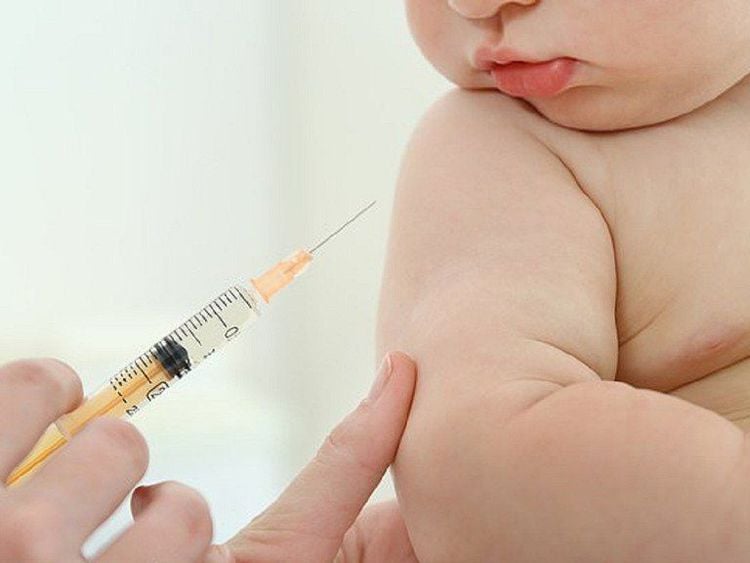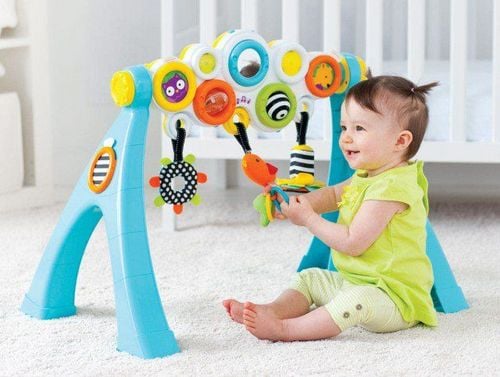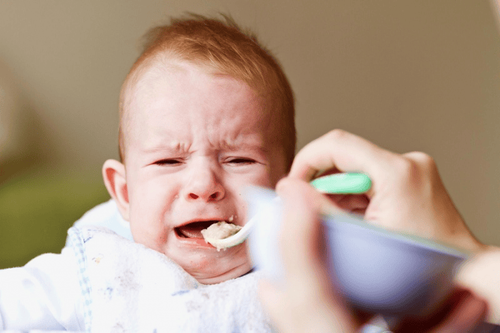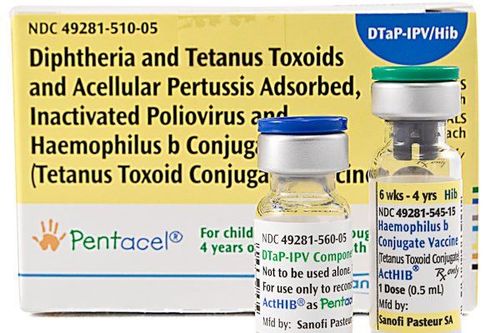This is an automatically translated article.
Parents are always eager to find out what a baby's physical exam is like. A well-child check-up schedule should be built around the baby's key developmental milestones. Health check-up for a 9-month-old baby is a job that should not be overlooked. Parents can refer to the questions that doctors often ask and prepare answers.1. What will the doctor do when examining a 9-month-old baby?
Weighing and measuring children Parents need to take off all of their baby's clothes to accurately weigh them. The doctor will weigh the baby, measure the length and circumference of the head, and record the results on the baby's growth chart.Growth chart allows parents to track their child's development, compare their child's development with other children of the same age. If a child's growth rate slows down a bit, parents shouldn't be too worried because most babies go through the same thing at this age, after which they will grow steadily.
Comprehensive physical exam Heart and lungs: Use a stethoscope to listen for any irregular heartbeat or breathing problems. Eyes: Check for suspected symptoms of congenital eye diseases and other problems. The lacrimal gland and tear duct system are also examined. Ears: Look for signs of an ear infection such as an inflamed discharge, frequent scratching of the ear, and observe how the baby responds to sounds. Mouth: Look for signs of infection in the gums or lining of the mouth. Monitor the newly erupted teeth and the condition of the previously erupted teeth. Head: Observe the shape of the head and check that the anterior and posterior fontanelles are closed. Body: Check your baby's reflexes and muscle tone, and check his or her skin for rashes and paleness. Pale skin is a sign of iron-deficiency anemia, which babies are at high risk for between 9 and 24 months of age. Abdomen: check and detect hernias such as umbilical hernia, abdominal wall hernia. The doctor will also palpate the abdominal wall to look for other abnormalities such as an enlarged liver or an enlarged spleen. Genitals: Remove diaper and check for signs of infection in the external genitalia. Hips and Legs: Move your baby's legs around the hip to look for hip problems. Vaccinations for children Give your baby a booster shot for previously missed shots. Children as young as 9 months old should also get a flu shot if it's flu season.
Administration of vaccinations – vaccines should be delegated to another medical assistant. This person is responsible for reminding and performing other administrative tasks related to vaccination for children. Generally, children should be vaccinated at the end of a physical visit so as not to interrupt other parts of the doctor's work if they are fussy.

Trẻ trong độ tuổi 9 tháng cũng nên được chủng ngừa cúm nếu đang trong mùa cúm
2. Questions a doctor may ask during a physical examination of a 9-month-old baby
How do children sleep? A 9-month-old baby may wake up frequently during the night. Children miss the joy and companionship of the day and will be reluctant to go to sleep. The doctor can offer helpful advice, especially if parents provide detailed information about the child's sleep habits. The average 9-month-old baby sleeps 10 or 11 hours at night and three or four hours during the day.How do children eat? At this point, your baby may have started eating a few snacks on his own, so the doctor will ask how things are going. Let the doctor know if your baby has trouble with solid foods or drinking from a cup with a straw.
Baby is crawling? At this point, your baby may be crawling or getting around by some other means such as tuck, roll, or tuck. If he hasn't already done so, he will soon start to stand up.
What does your baby say? Babies can put syllables together and make sounds that sound like voices. Babies can even say "mama" and "dada", although many babies still can't speak by 9 months. The child now knows and responds correctly to his or her own name and a few other familiar words. If your baby doesn't make any sounds or makes less noise than before, tell your child's doctor.
Does the child point to objects? Between the ages of 9 and 12 months, most babies begin to point at things that grab their attention, such as animals and toys. It was a non-verbal way of communicating with one's surroundings and was an important milestone in language development.
What games does your baby like to play? Most 9-month-olds love imitation games and find great fun with toys they can bang and shake. It's all part of learning how the world works.
How are children's fine motor skills? Your baby is learning to use his thumb and forefinger in a grip that allows him to pick up even the smallest objects. Children may also enjoy using their index finger to poke and explore things.
How does the child react to strangers? Many 9-month-olds are experiencing separation anxiety and stranger anxiety. They are attached to their parents and other family members, and are wary of people they don't know.

Khám sức khỏe cho trẻ 9 tháng tuổi là một việc làm không nên bỏ qua
How is the child's vision? At each physical examination of your baby, the doctor should check the structure and alignment of the eyes and the correct movement of the eyes.
How is your baby's hearing? If the child does not respond to the sound, be sure to notify the doctor immediately. The sooner potential hearing problems are detected, the sooner they can be treated.
Is the house layout suitable for a 9 month old baby? There are areas where children should be restricted from entering for their safety, such as electrical outlets. Now is also a good time to check that all medications and household chemicals are securely locked, and post the poison control hotline phone number in a visible place.
A general health check for the baby does not take time, when noticing any differences in the child or having a need to monitor the child's development, parents can completely make an appointment with the medical examination and treatment facilities. reputation. The time for a general health check for the baby is about 2-3 hours. Results will be returned within a day or so, currently some medical facilities also support home delivery of results after 2-3 days.

Khám sức khỏe tổng quát cho bé không hề tốn thời gian, khi nhận thấy những khác lạ ở trẻ hoặc có nhu cầu theo dõi sự phát triển của con, phụ huynh hoàn toàn có thể đặt lịch trước với các cơ sở khám chữa bệnh uy tín
If you have a need for consultation and examination at Vinmec Hospitals under the nationwide health system, please book an appointment on the website for service.
Please dial HOTLINE for more information or register for an appointment HERE. Download MyVinmec app to make appointments faster and to manage your bookings easily.
Reference source: babycenter.com












